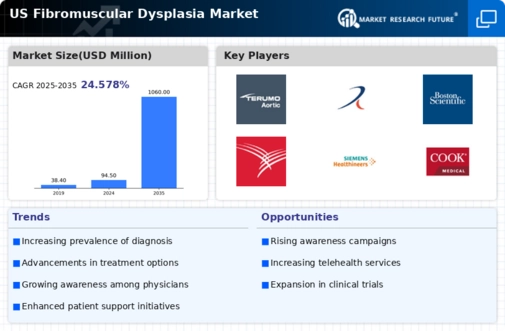Growing Patient Population
The fibromuscular dysplasia market is experiencing growth due to an increasing patient population. As awareness of fibromuscular dysplasia rises, more individuals are being diagnosed with this condition. The prevalence of fibromuscular dysplasia is estimated to be around 1 in 1,500 to 1 in 2,000 individuals in the US, indicating a significant number of potential patients. This growing patient base is likely to drive demand for diagnostic tools and treatment options, thereby expanding the fibromuscular dysplasia market. Furthermore, the aging population is more susceptible to vascular diseases, which may contribute to a higher incidence of fibromuscular dysplasia. As healthcare providers become more vigilant in identifying this condition, the market is expected to see a corresponding increase in the availability of specialized care and treatment solutions.
Rising Healthcare Expenditure
Rising healthcare expenditure in the US is a significant driver for the fibromuscular dysplasia market. As healthcare budgets expand, there is a greater allocation of resources towards specialized treatments and diagnostic services for conditions like fibromuscular dysplasia. The US healthcare expenditure is projected to reach approximately $4 trillion by 2025, indicating a robust investment in healthcare infrastructure. This increase in spending is likely to facilitate the development of new therapies and improve access to care for patients suffering from fibromuscular dysplasia. Furthermore, as insurance coverage expands, more patients may seek treatment, thereby contributing to the growth of the fibromuscular dysplasia market.
Enhanced Diagnostic Capabilities
The fibromuscular dysplasia market is poised for growth due to enhanced diagnostic capabilities. Advances in imaging technologies, such as high-resolution MRI and CT angiography, are enabling more accurate and timely diagnoses of fibromuscular dysplasia. These improvements are crucial, as early detection can significantly impact treatment efficacy and patient prognosis. The market for diagnostic imaging is expected to expand, with a projected growth rate of 10% annually over the next few years. As healthcare providers increasingly adopt these advanced diagnostic tools, the fibromuscular dysplasia market is likely to benefit from a surge in diagnosed cases, leading to greater demand for subsequent treatment options.
Increased Focus on Rare Diseases
The fibromuscular dysplasia market is benefiting from a heightened focus on rare diseases within the healthcare sector. As healthcare policies evolve, there is a growing recognition of the need to address conditions that have historically been overlooked. This shift is leading to increased funding for research and development, which is essential for understanding fibromuscular dysplasia and developing effective treatments. In the US, initiatives aimed at promoting awareness and research for rare diseases are gaining traction, potentially leading to a 20% increase in funding for related studies. This influx of resources is likely to stimulate innovation and enhance the overall landscape of the fibromuscular dysplasia market, ultimately improving patient outcomes and access to care.
Technological Innovations in Treatment
Technological advancements in treatment options are playing a crucial role in the fibromuscular dysplasia market. Innovations such as minimally invasive surgical techniques and advanced endovascular procedures are enhancing patient outcomes and reducing recovery times. For instance, the introduction of new stenting technologies has shown promise in treating vascular complications associated with fibromuscular dysplasia. The market for these advanced treatment modalities is projected to grow, with estimates suggesting a potential increase of 15% in market value over the next five years. Additionally, the development of targeted therapies and personalized medicine approaches may further revolutionize treatment paradigms, making it imperative for healthcare providers to stay updated on these advancements to improve patient care in the fibromuscular dysplasia market.
















